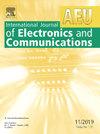Block Amari Alpha Least Mean Square Algorithm based Channel Estimation for MIMO Network
IF 3.2
3区 计算机科学
Q2 ENGINEERING, ELECTRICAL & ELECTRONIC
Aeu-International Journal of Electronics and Communications
Pub Date : 2025-09-06
DOI:10.1016/j.aeue.2025.156011
引用次数: 0
Abstract
With the increase in the number of users, the channel estimation in the presence of pilot contamination has become more challenging. To reduce the computational complexity involved in performing adaptive channel estimation in real time, block adaptive filters are widely used. This paper proposes a channel estimation technique that uses least mean square (LMS) adaptive filtering algorithm based on information-theoretic divergence, named Amari-Alpha divergence based Block LMS (AABLMS) algorithm. This algorithm is used to study a scenario where multiple users receive contaminated pilot signals. The condition for convergence of the proposed AABLMS algorithm in the mean sense is derived, and the upper and lower bounds for the learning rate are derived. Further, the block counterparts of existing state-of-the-art LMS variants are compared with that of the proposed AABLMS algorithm in terms of computational complexity, mean square deviation (MSD), and mean square error (MSE). The simulation results show that the proposed AABLMS algorithm performs better than other block LMS-based counterparts in the presence of channel noise and pilot contaminating noise.
基于块Amari Alpha最小均方算法的MIMO网络信道估计
随着用户数量的增加,存在导频污染的信道估计变得更加具有挑战性。为了降低实时自适应信道估计的计算复杂度,块自适应滤波器得到了广泛的应用。本文提出了一种基于信息论发散的最小均方自适应滤波算法的信道估计技术,称为基于Amari-Alpha发散的块LMS (AABLMS)算法。该算法用于研究多用户接收到受污染导频信号的情况。推导了该算法在平均意义上收敛的条件,并给出了学习率的上界和下界。此外,在计算复杂度、均方偏差(MSD)和均方误差(MSE)方面,将现有最先进LMS变体的块对应体与提出的AABLMS算法进行了比较。仿真结果表明,在存在信道噪声和导频污染噪声的情况下,本文提出的AABLMS算法的性能优于其他基于块lms的算法。
本文章由计算机程序翻译,如有差异,请以英文原文为准。
求助全文
约1分钟内获得全文
求助全文
来源期刊
CiteScore
6.90
自引率
18.80%
发文量
292
审稿时长
4.9 months
期刊介绍:
AEÜ is an international scientific journal which publishes both original works and invited tutorials. The journal''s scope covers all aspects of theory and design of circuits, systems and devices for electronics, signal processing, and communication, including:
signal and system theory, digital signal processing
network theory and circuit design
information theory, communication theory and techniques, modulation, source and channel coding
switching theory and techniques, communication protocols
optical communications
microwave theory and techniques, radar, sonar
antennas, wave propagation
AEÜ publishes full papers and letters with very short turn around time but a high standard review process. Review cycles are typically finished within twelve weeks by application of modern electronic communication facilities.

 求助内容:
求助内容: 应助结果提醒方式:
应助结果提醒方式:


